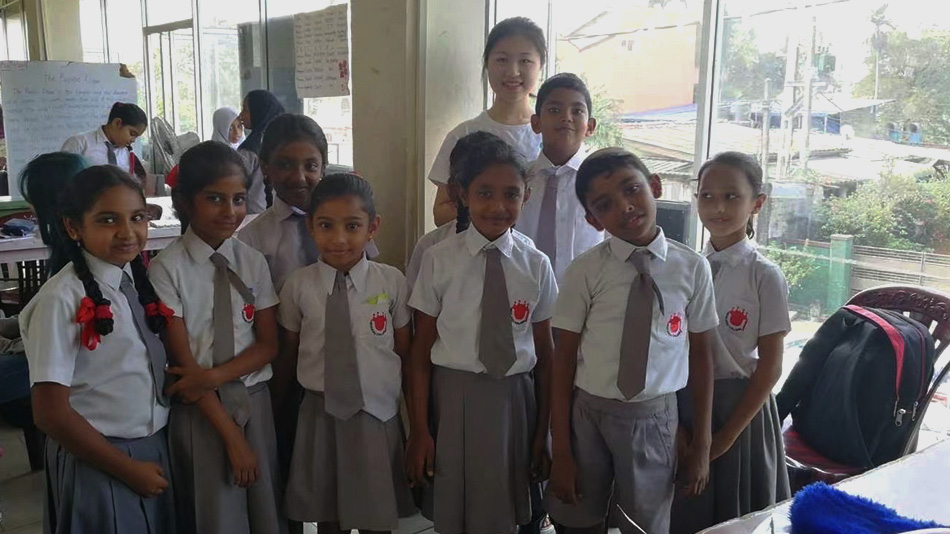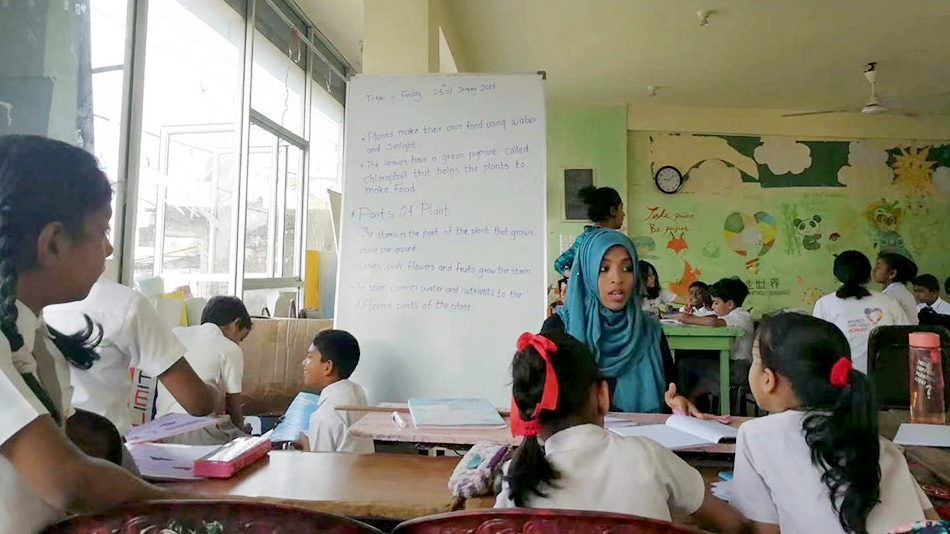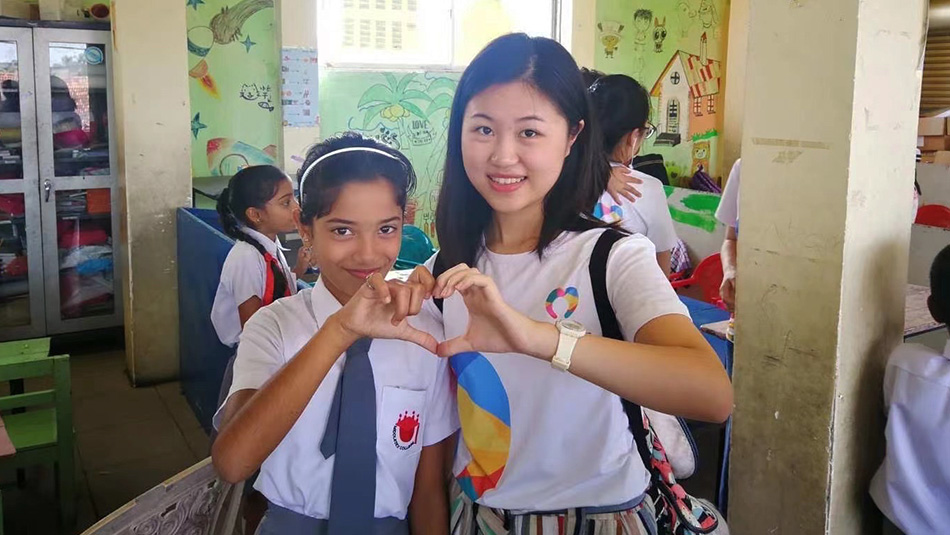With more Chinese students heading overseas every year on volunteer projects, what is their motivation? Is it to see the world and do something positive, or is it just a way to get ahead on their CV?
It was the summer of 2019, and many graduates who had just finished their graduation ceremonies were preparing for their graduation trips. Yan Xinran, a girl who had just completed her four years at university, was planning an unusual graduation trip with her best friend.
As the plane landed at Bandaranaike International Airport, Xinran looked at the tall coconut palms in the distance and the heat waves rising from the airstrip. She began to look forward to this special graduation trip.
Standing on the island’s sandy beach, she took a deep breath as the warm, moist tropical sea breeze blew towards her from the beach, feeling the saltiness and humidity of the sea in the air. It was her first time visiting this country.

For Xinran, this graduation tourism is more than just a trip abroad with her best friend after graduating from university. She decided to be a volunteer teacher in Sri Lanka for two weeks to get a certificate. She believed the certificate could help her apply for postgraduate studies in Hong Kong.
“I was thinking about going on a graduation tourism to Sri Lanka, and I found out that there was volunteer tourism there, so I joined the project,” says Xinran, “It is killing two birds with one stone.”
Like Xinran, more young Chinese people participate in volunteer tourism to enhance their background. More than half of the Chinese volunteers participate in overseas volunteering projects to obtain certificates and improve their CVs for further study overseas, according to China International Volunteer Opportunities Research Report 2021 by PUMBAA ECO.
It was all about studying abroad. The volunteer travel experience is the icing on the cake
Xinran
She heard from a friend who also has a plan for further study abroad that volunteer tourism would boost her CV and improve her chance of getting into top universities. As she was planning to obtain a master’s degree in Hong Kong, she went to Sri Lanka for a two-week volunteer teaching project in 2019.
Volunteer tourism has thrived in China, more Chinese people have started volunteering. According to a recent report by the Chinese Academy of Social Science, the total amount of volunteers reached 217 million in China, representing 15.4% of the country’s total population. This figure is 73 times higher than a decade ago.
Over the last decade, some volunteer organisations have emerged in China offering volunteer travel services, including Gapper, LeanIn, AIESEC, and World without Borders. These organisations provide a wide range of volunteer trips both domestically and abroad.
Overseas volunteer travel projects are the most popular among the many volunteer tourism schemes. Because many Chinese students believe that compared with the domestic projects, volunteering abroad not only provides a chance to experience foreign cultures during the trip but also offers them an opportunity to enhance their CVs.
For Chinese students who plan to study abroad, overseas volunteer tourism is a general approach to enrich their CVs. They see the experience as a plus to applying for prestigious universities abroad. “All four of my classmates who planned to study abroad have participated in volunteer programs,” says Xinran, “I think most students are recommended the volunteer projects by study abroad agents. They say that schools look for the overall development of the student.”
Not only do students believe that volunteering abroad will help them get offers from top universities, but also many Chinese volunteering organisations use background enhancement as a significant selling point for volunteer tourism projects.

On the official account of a well-known Chinese volunteer platform, OCVIA, the organisation emphasises background enhancement as a significant highlight of its overseas volunteering programme. In the introduction of their overseas projects, it is clearly stated that volunteer certificates can enrich a CV and help with applications to overseas schools or positions.
However, some experts claim that the value of an international volunteer certificate is not as high as Chinese volunteers think. The certificate is not a doorstop for them to get into top universities or companies.
Pippa Biddle, who used to be a volunteer tourist to Tanzania when she was in high school, is now an author of a book on volunteer tourism. She believes that a certificate attesting to volunteer experience doesn’t mean much. “It’s a piece of paper with a gold foil stamp on it. That doesn’t really mean anything. It doesn’t mean you have any particular skills. So, I just don’t put much weight in them, or like think very much about them, because they’re just to me like so frivolous,” says Pippa Biddle, “I think a lot of big companies and a lot of universities, especially in the US have become very suspicious of them.”
Wei shared a similar opinion with Pippa Biddle. She doesn’t see any value in the volunteer certificate, according to this Chinese freelancer who joined a volunteer teaching project in Thailand in the summer of 2017.
I think some people may see the overseas teaching project as a way to enhance their CVs. But personally, I didn’t take part in the volunteer teaching with the intention of getting the certificate. Also, I didn’t feel that the experience would add anything to my CV
Wei

Wei sees little value in the volunteer certificate. “I think the value of the volunteer experience depends on the individual’s future goals,” she says. “But even if you want to be a teacher in the future, teachers in China need a teaching qualification, not a voluntary teaching experience overseas.”
The experience of helping others in need is more important than a certificate, according to a CEO of a Chinese volunteer organisation, Liu Liangbin. He hopes that the volunteers will emphasise the skills and knowledge gained from the volunteering experience rather than a certificate at the end.
Most participants are likely to come to the volunteer projects for academic reasons. And this is especially true for students who have plans to study abroad, as they join overseas projects for personal skills and background enhancement, according to Liangbin.
“I always tell the students and their parents who are involved in the project that even a certificate from the United Nations is not as important as the experience,” he says. “Because admissions officers are not looking for your certificates, but your real experience and what you have gained at the time.”
Although most of the volunteers are motivated by the intention to enhance their CVs, there are still some volunteers attracted by the opportunity to interact with local communities and experience foreign cultures, according to a China-based study from 2011.
Li Tiange participated in a volunteer teaching project in Sri Lanka in 2019. She joined the project because the country was mysterious and beautiful to her, and she believed that volunteering could be a better way for her to interact with the locals and know more about the culture.

“I was curious about Sri Lanka,” says Tiange, “There are children in need both in China and some foreign countries, but by going to Sri Lanka, I can help others, and at the same time, I can experience a foreign culture.”
According to Tiange, volunteer tourism is more meaningful than just travelling to Sri Lanka. She also believes that the volunteer certificate does not carry much weight and that she only joined the project to satisfy her interest.
As a volunteer who used to spend two months teaching in a rural primary school in China before her volunteer journey to Thailand, Wei’s reason for joining an overseas volunteer project is a little different.
“I’ve been quite interested in volunteer teaching,” says Wei. “I joined the project because I wanted to see the differences between domestic and international volunteer teaching and how the education system was different in China and abroad.”
Although Xinran took part in the project intending to get the certificate, the experience in Sri Lanka is still a precious memory for her.

“I would still like to join this project again if I have the chance,” says Xinran. “Because Sri Lanka is a wonderful country. Also, I had a lot of fun with the children, and they were so simple and lovely.”
Now three years past, Xinran has successfully received an offer from her dream university in Hongkong. She now has a different perspective on the value of her volunteer certificate.
“I think I overestimated the value of this volunteering experience,” says Xinran, “If it were a few years ago when I was younger, I would have thought that the volunteer experience would have had a huge impact on my application for foreign university. But to be honest, looking back now, I think it was really just a tiny plus on my resume.”